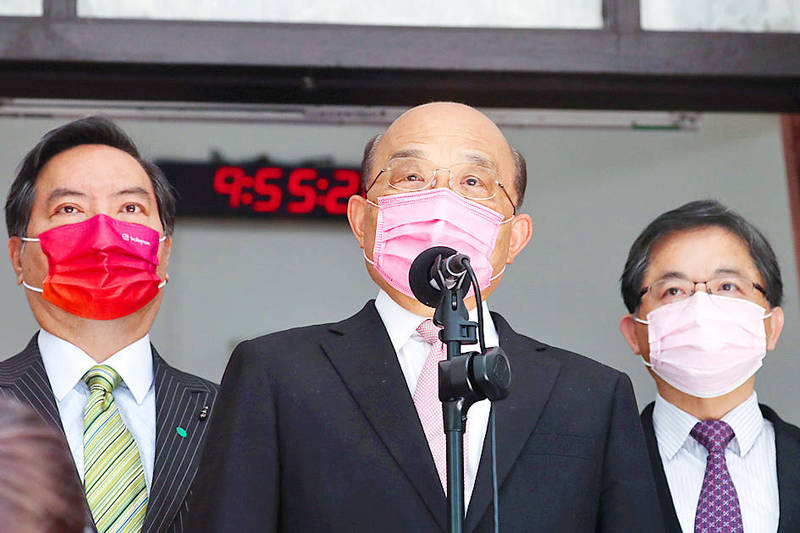《TAIPEI TIMES》 Lifting Japan food ban not an issue: Su

Premier Su Tseng-chang, center, speaks to reporters before attending a plenary session at the Legislative Yuan yesterday. Photo: CNA
CROSS-STRAIT RIVALS: China faces more challenges in bringing its regulations in line with CPTPP standards, while Taiwan offers better economic integration, an expert said
By Hsieh Chun-lin, Wu Chi-lun and Jonathan Chin / Staff reporters, with staff writer
Lifting a ban on certain Japanese food imports is not a precondition for Taiwan’s accession to the Comprehensive and Progressive Agreement for Trans-Pacific Partnership (CPTPP), Premier Su Tseng-chang (蘇貞昌) said yesterday.
Su made the remarks in response to media queries on Taiwan’s formal application on Wednesday to join the CPTPP after Minister Without Portfolio John Deng (鄧振中) said that the nation’s ban on certain Japanese food imports — implemented after the Fukushima Dai-ichi nuclear plant disaster of March 11, 2011 — would be an obstacle to the negotiations.
For food safety reasons, the then-Chinese Nationalist Party (KMT) government banned imports of food and agricultural products from the Japanese prefectures of Fukushima, Ibaraki, Gunma, Tochigi and Chiba following the disaster.
Since regaining power in May 2016, the Democratic Progressive Party (DPP) has said that it is considering lifting the ban, but no progress has been made on the issue.
Deng, head of the Executive Yuan’s Office of Trade Negotiations, yesterday said that Taiwan “definitely needs to face the issue once the Japanese side asks us to lift the ban.”
The government will resolve the issue with Japan by following international standards and scientific evidence, while safeguarding public health, Deng said, adding that Taiwan will learn from the example of the US, which on Wednesday announced that it was lifting all restrictions on imports of food products from Japan established in the wake of the 2011 nuclear disaster.
Su yesterday said the DPP government expects that its application to join the trade group would be accepted without issue, citing Taiwan’s economic freedom, laws and regulations, and feedback from CPTPP members during unofficial negotiations.
“There are no preconditions about food imports from Fukushima in connection to this matter,” Su said.
“We deal with food products according to public health, scientific evidence and internationally accepted standards,” the premier added.
Taiwan will discuss the food import ban with Japan as part of the application process, Council of Agriculture Minister Chen Chi-chung (陳吉仲) said yesterday before conceding that Tokyo is “deeply concerned” about the ban.
Taiwan and China are the only countries that continue to ban food imports from areas in Japan affected by the nuclear plant disaster, he said.
“Our principle is to let science decide the handling of food safety in Taiwan,” Chen said, adding that more than 170,000 food items from Japan had been tested since the 2011 incident and all had met safety standards.
Commenting on the matter, National Central University economics professor Chiou Jiunn-rong (邱俊榮) on Wednesday said that Taiwan’s bid to join the CPTPP hinges firstly on the food import ban and secondly on political factors.
Taiwan has better economic integration than China, which submitted its application to join the trade group on Thursday last week, he said, adding that Taiwan has more experience in negotiating with CPTPP members over trade.
As the most significant player in the CPTPP, Japan will have an outsized voice in deciding Taiwan’s bid to join the group, he said.
This means the import ban must be handled in a way that does not offend Japan, he said.
Resolving the food import ban is almost certain to guarantee the country’s entry to the CPTPP, he said.
China is facing more challenges in its application than Taiwan, Chiou said.
For its bid to be successful, Beijing will have to bring its laws and regulations up to CPTPP standards, especially those governing state-owned enterprises, labor rights, environmental standards and intellectual property, he added.
Regarding Beijing-directed political interference, Chiou said that the US-China trade dispute has made it a necessity for the US, Japan and Australia to back Taiwan.
This would bring to bear a level of pressure that China would not be able to match with its allies, such as Peru, he said, adding that most of the CPTPP members are already favorably disposed toward Taiwan.
“Unless there is a very powerful political reason, most of the group’s members, particularly Japan, are allies that would welcome Taiwan’s bid,” he said.
Additional reporting by CNA
新聞來源:TAIPEI TIMES


















